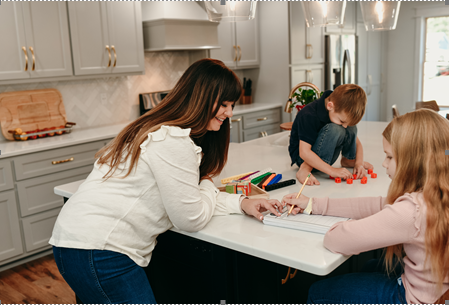
Editor’s note: In keeping with our year-end tradition, the team at reimaginED reviewed our work over the past 12 months to find stories and commentaries that represent our best content of 2022. This post from reimaginED senior writer Lisa Buie is the eighth in our series. You can learn more about education choice advocate Jamie Buckland here.
 “The hope is for my work to amplify the cries of the frustrated parents who are tired of it being so incredibly hard to provide a quality education for their children in our state.” – Jamie Buckland
“The hope is for my work to amplify the cries of the frustrated parents who are tired of it being so incredibly hard to provide a quality education for their children in our state.” – Jamie Buckland
Jamie Buckland is a mom of four who lives on a farm in the small town of Flat Top, West Virginia. She began homeschooling in 2007 when her oldest son, Ethan Lane, now 21, reached school age. Her list of accomplishments in the arena of education choice is long and impressive. In 2016, she helped organize Appalachian Classical Academy, a small nonprofit homeschooling co-op run entirely by volunteers. Buckland currently serves as executive director and headmistress and provides weekly tutoring in Spanish, history, nature study, geography, and folk dancing as well as high school literature.
In 2019, she became legislative liaison for Raleigh Educational Association for Christian Homeschoolers, also known as R.E.A.C.H. in 2020, the group helped pass a home access bill that allowed homeschoolers to participate in extracurricular activities at district schools. She is currently working to help homeschoolers navigate the requirements of the legislation to take advantage of the new opportunities it provides.
Buckland began working last year with national advocacy groups EdChoice and yes. every kid as a full-time advocate to support efforts to implement the state’s newly approved Hope Scholarship and to assist in creating a statewide parent network to support families in determining the best options for their children. Buckland recently started a statewide tour that includes workshops to educate communities on K through 12 options for the 2022-23 school year. The new group, West Virginia Parents for Education Choice, aims to become the primary resource for parents and is forming a founding board. A website is expected to launch at the end of February. To learn more, visit the group’s Facebook page.
The Cardinal Institute of West Virginia took notice of all Buckland’s hard work and named her its School Choice Parent Advocate of the Year for 2022 during National School Choice Week. Here are details of her journey, which she shared recently with reimaginED.
Q. Please tell me about your own educational experience. What type of schools did you attend? Did you benefit from any kind of education choice?
A. I grew up in Harper Heights, a small neighborhood in Beckley, West Virginia. I was a Crescent Chipmunk, a Park Roadrunner, and a Woodrow Wilson Flying Eagle, all public schools. For the most part, I had fantastic teachers who invested more than was necessary in hopes of me realizing the potential that they saw. My greatest teacher was, and still is, my father. His passion for helping me and my sisters fully grasp ideas that were being introduced in school was foundational to our understanding and growth.
Q. Tell me a little about your kids, ages, interests, etc. How did you end up homeschooling your children? Why do you think it was the best fit for your family?
A. Ethan Lane is now 21 and lives in Lee’s Summit, Missouri. He is enjoying his independence, working full time, and getting good practice at being an adult. Emma Rae is 18 and works full time as a vet tech assistant at a wonderful veterinarian’s office. She is also getting good practice at being an adult. She moved into an apartment with a roommate just after Christmas and will graduate from my homeschool in May. We began homeschooling the summer before Ethan started first grade. The reason we chose to opt out of public education after Pre-K and kindergarten was because we simply wanted to fit school in around our lives instead of attempting to squeeze in life around school.
Q. What were some the biggest challenges, and how did you overcome them?
A. My approach to life is not so laid back. I tend to tackle projects with a passion that can easily overwhelm those around me. Unfortunately, I didn’t realize how much harm that was doing to my children who were in want of a mother, not a manager. My firstborn is resilient. Raising him has taught me a great deal. Thankfully, I grew in self-awareness and have been able to modify my behaviors to embrace coming alongside my children instead of hovering over top of them.
I’ll also add that encountering Charlotte Mason’s principles and becoming a student of her work has transformed our homeschool, and incidentally our lifestyle.
Q. You are very up front about the fact that you didn’t attend college. Some critics of education choice and homeschooling might use that against you and argue that you and other parents in the same situation aren’t qualified. What is your response to those people?
A. Define qualified. Must one be certified via an institution to be qualified?
I’d argue certification is a tool for assessment. I’d argue relying on an institution to assist in your education is one approach. But I’d also argue that my education has happened outside of an institution, and I’d welcome anyone with concerns about that to assess me. Conversation is my favorite tool for assessment.
Q. How did you end up choosing a classical education format? What distinguishes it from other models?
A. The sincere reality is that the term “classical” has been hijacked. When we organized Appalachian Classical Academy, we were immersed in a neoclassical approach to education. To be honest, we didn’t know that there was such a thing as classical and neoclassical. As we learned and grew, we began to deconstruct the assumption that children learn best with a “grammar-logic-rhetoric, ages and stages” system. This system is what most classical educators today think of when they hear the term.
I believe a true classical tradition doesn’t involve such constraints. We are still transitioning to fully embrace the Charlotte Mason Method, which we believe is the truest form of a classical education. Here’s my personal definition: To classically educate is to lead someone out of insufficient thought by using worthy language intended to stir the student to consider the source of ideas, that they may be able to adequately consider whether such ideas are to be embraced or rejected.
Q. What is your favorite subject to teach? What have you learned from teaching the curriculum?
A. My favorite is probably Latin, although as I age, my affection for literature is growing. I believe this reflects my journey. Highly inflected languages follow such a beautiful order that my logical, mathematical brain thoroughly enjoys the tasks of pulling all the pieces together. Yet as I become more aware of my bent towards the concrete, I am more inclined to lean into the space that isn’t contained by such forms. Reading good books with these brilliant children shapes a soul in a different way than conjugating Latin verbs.
Q. Please describe your role as an advocate for education choice. How long have you been working to get ed choice for West Virginia, and what did that entail?
A. In 2019, I felt compelled to better understand charter schools, stumbled upon the Cardinal Institute’s work, and met with executive director Garrett Ballengee to hear his arguments for school choice. Having a desire to understand the full picture, I then interviewed teachers, teacher union reps, principals, and superintendents. Around the same time, I was asked to serve as legislative liaison for R.E.A.C.H., a homeschool support group serving southern West Virginia. My work as their liaison was centered around listening. How can you be effective at communicating on behalf of parents if you aren’t listening to parents?
I spend most of my time challenging false narratives and ensuring individuals have accurate information to form perspectives. My strategy has been to develop relationships with county board employees, those serving us at the West Virginia Department of Education, private school administrators, homeschoolers, and in recent weeks, those involved with charter schools. I think what I bring to the efforts is a desire to challenge the “us” vs “them” at its very core. The hope is for my work to amplify the cries of the frustrated parents who are tired of it being so incredibly hard to provide a quality education for their children in our state.
I also think there is a considerable need for organizations involved in this school choice movement to respect the parents and parent advocates on the ground. There is a disconnect from those driving the movement and those of us sustaining the movement. I hope I can raise awareness to these concerns and see effective change sooner than later.
Q. Tell me about what role you played in passing a home school access bill in West Virginia and how that is now benefiting homeschool students.
A. In the fall of 2019, after being asked to serve as legislative liaison for R.E.A.C.H., we surveyed our members. The top three requests were to have access to sports, vo-tech, and therapy. We were told that 2020 wouldn’t be the year for any of that, but we mobilized parents and lobbied legislators anyway, and it was passed just as the pandemic was starting. The law isn’t ideal, but it has given access to hundreds of kids that wouldn’t have played otherwise. Once it went into effect, I worked alongside other advocates throughout the state to help see it implemented. We have a way to go, as many don’t understand the process or don’t even know it is an option. Our hope is with organizing West Virginia Parents for Education Choice, we can finally serve homeschoolers who are interested in this kind of opportunity with a statewide presence.


